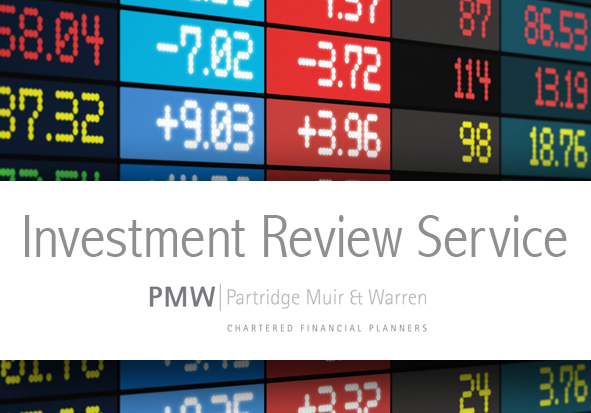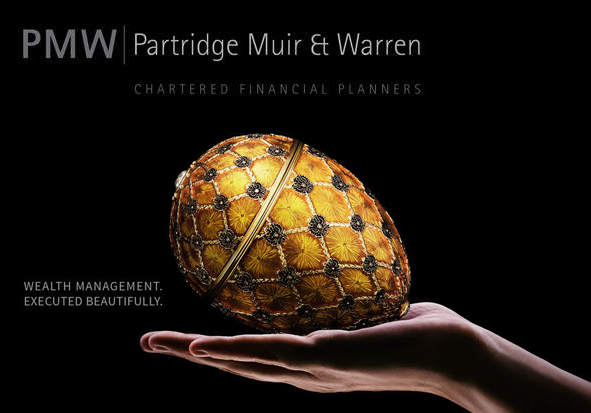FINANCE
Surrey’s Premier Lifestyle Magazine
Outlook for 2019 - A melting pot of negativity
Simon Lewis, CEO at Partridge Muir & Warren, points out the importance of having a ‘light hand on the tiller’ to make portfolio adjustments in uncertain economic times.

2018 was the worst year for investors since 2008. The year started badly when investor sentiment deteriorated as a consequence of the escalating trade dispute between the US and China, but there was an unexpectedly prolonged recovery in sentiment during the summer months. The severity of the fall that we saw in financial markets at the end of the year was a consequence of the fact that markets had managed to get ahead of themselves during that period. What occurred in October and December was a reality check for investors as fear about the possible consequences of a number of factors bubbled to the surface.
Although an uncomfortable experience at the time, the fall in financial markets has been a good thing because it means that the value of financial assets now better reflects their future potential. There is therefore more scope for positive returns from here forward. However, investors should be warned that such potential might take a long time to be realised because for the time being, sentiment is likely to be dominated by a number of negative influences.
I think that had most voters anticipated what a palaver this was going to be, we would have all stayed at home and chosen to not vote for anything at all. I suppose it is no real surprise that there is such division in Parliament when we consider that there was clearly such division among the electorate. Yes, the result was in favour of leaving, but it was finely balanced and one would expect in a democracy that Parliament would reflect the views of the people and that is exactly what it is doing. So it isn’t necessarily that Theresa May is doing a particularly bad job; although clearly there is room for improvement. The reality is that no one currently on the political scene would seem to have the capability of resolving this to the satisfaction of everyone, because opinions are so polarised. I think that it is likely that we will lurch on from political crisis to crisis for some time to come. Businesses need to have an idea of what the future is going to look like so they can plan and at the moment this just isn’t possible, so the outlook for the UK economy is not going to improve any time soon.
However, looking at the situation through the prism of an investor, there is already a lot of bad news in UK share prices (specifically, those of small and medium sized quoted companies that have a domestic focus), so a reasonable bounce is likely once the outlook becomes clearer.
Although an uncomfortable experience at the time, the fall in financial markets has been a good thing because it means that the value of financial assets now better reflects their future potential. There is therefore more scope for positive returns from here forward. However, investors should be warned that such potential might take a long time to be realised because for the time being, sentiment is likely to be dominated by a number of negative influences.
US Monetary Policy
The big driver behind financial market volatility is the trend and outlook for US monetary policy. I covered this extensively in previous articles but in summary, rising interest rates are increasing the cost of borrowing globally and quantitative tightening (‘shredding’ $50 billion a month of the money ‘printed’ as a result of quantitative easing) is reducing financial market liquidity.Brexit
We should not underestimate the economic damage being caused by the political stalemate that we have found ourselves in and there is sadly no end in sight. There is the continued uncertainty over what our future terms of trade will be and as a consequence, many businesses, domiciled in both the UK and overseas, are struggling to justify investing in the UK. But just as significantly, the UK Government is currently dysfunctional, which means that insufficient attention is being paid to how the country will deal with the profoundly disruptive impact of technology and changing consumer behaviour. No one seems to be paying any attention to the fact that our high streets are dying in the face of competition from internet shopping, as they are burdened with rising wage bills and an unfair tax regime.I think that had most voters anticipated what a palaver this was going to be, we would have all stayed at home and chosen to not vote for anything at all. I suppose it is no real surprise that there is such division in Parliament when we consider that there was clearly such division among the electorate. Yes, the result was in favour of leaving, but it was finely balanced and one would expect in a democracy that Parliament would reflect the views of the people and that is exactly what it is doing. So it isn’t necessarily that Theresa May is doing a particularly bad job; although clearly there is room for improvement. The reality is that no one currently on the political scene would seem to have the capability of resolving this to the satisfaction of everyone, because opinions are so polarised. I think that it is likely that we will lurch on from political crisis to crisis for some time to come. Businesses need to have an idea of what the future is going to look like so they can plan and at the moment this just isn’t possible, so the outlook for the UK economy is not going to improve any time soon.
However, looking at the situation through the prism of an investor, there is already a lot of bad news in UK share prices (specifically, those of small and medium sized quoted companies that have a domestic focus), so a reasonable bounce is likely once the outlook becomes clearer.
The US Economy
Looking across the Atlantic again we have Donald Trump and his dispute with Congress over a wall that he wants to build. Although it now appears it will be more like a fence and indeed there is a fence there already; so it doesn’t seem like such a big change after all. It has become more of an ideological division; on the right of the political spectrum we have those who want to keep people out and on the left those willing to welcome them with open arms. Being pragmatic about this, the reality is that South America generally is a place of political and economic instability and there is a natural flow of migration from South to North that is likely to accelerate. Look at what is happening in Venezuela for example, it is likely that more people are going to leave because there is no future for them. It isn’t necessarily unreasonable for a nation that has become a magnet for people who want to leave unstable countries to have some form of control over who can enter. In many ways it is no different from the debate about Brexit and the argument to have more control of our own borders and of immigration. It is the same issue; it is just that Trump expresses it in a rather unsavoury way.So, we have this government shut down in the US. In the short term the effect on the economy is not that significant, but in the long term the dispute will cause greater uncertainty. The simple fact that many federally employed workers are not being paid will have an impact, resulting in a slowdown of the US economy.
China
As the US and China trade spat continues to escalate, there are concerns about what impact it will have generally on global economic growth. Not to mention the fact that last year it became clear that the Chinese economy is slowing down at a faster rate than previously thought, and everyone knows that there is a lot of corporate debt in china. There are concerns about whether the Chinese government have the financial tools to properly deal with a crisis that might erupt there in the event that the debt becomes unsustainable.Europe
But all is not rosy in the rest of Europe. The Eurozone has been recovering, but the European central bank will be ending its quantitative easing programme in 2019, at least that is their plan. That will mean that financial markets in Europe will be less liquid as a consequence. Considering political risks, the elephant in the room last year was Italy and the fact that they were not cooperating with Brussels. They were not prepared to follow the Brussels economic rules and had their belligerence continued that could have resulted in a significant loss of confidence in the European banking system, because Italy has huge amounts of debt. Government debt, much of which is on the balance sheet of European banks and if you started to mark down the values of that it would mean that some of the banks would become significantly less solvent. But that risk seems to have been abated for the time being. At the end of the day that debt is still there so there are still risks for Europe.Asset Classes
In terms of asset classes, commercial property has had a reasonable run more recently but is now under pressure. In particular, the retail sector for lots of reasons, as mentioned above, that are not connected to Brexit or Trump. We are seeing a fundamental shift in the way in which consumers shop and that means that the high street is less relevant today than it once was. You cannot drive through many towns these days without seeing shops that are boarded up. In fact, I drove through a town recently where a Woolworths shop was still boarded up. Bearing in mind that they went into liquidation in 2008, effectively it means that shop has been empty for 10 years. I suspect there is a lot of pain to come for the UK commercial property sector and it will be imperative that those investing in property, take these factors into account.What is on the horizon?
As I have said, looking at fundamentals, the fact that markets have fallen means that they offer better value than they did before. Much of the froth has come out of share prices and this means there is now more chance that we will see positive returns during the course of 2019. Even considering this, we need to be realistic and expect those returns to be modest, because of the fundamental point that generally speaking interest rates are rising. Rising interest rates in today’s money means that the future value of long-term cash flows is reduced and that feeds through to share prices, giving a fairly level outlook for corporate profitability.So what do we think will be the main themes in 2019? We are hopeful that there will be some improvements for the prospects of the UK during the course of the year. For our clients that will mean that in due course we will be looking to strengthen our position in terms of exposure to sterling and also exposure to the UK economy, through exposure to small and medium sized companies in the UK; although at present it is still too soon to rush in as there are still too many political risks that present themselves.
So there is definitely potential, but it is really important right now that investment portfolios are well diversified and that appropriate time horizons are being considered. I am positive that there are many investors out there who are unwittingly holding investment that are particularly vulnerable to the next stage in the economic monetary policy cycle, so it makes sense for people to get their financial affairs reviewed to ensure that their better equipped to deal with the results of any predicted changes in 2019.
As far as our own clients are concerned, we play an active role in ensuring that the portfolio reflects where we are in the journey from a financial and economic prospective. Our style is to make lots of small adjustment on the ‘tiller’, to use a sailing analogy. You get a smoother journey if you make frequent small changes to your strategy rather than large infrequent ones. We use a little and often approach, rather than waiting for years and making big changes as a result of negative impacts on financial markets. This results in a much smoother experience, due to the fact that return on investment is as much about luck as judgement and the luck is timing and timing is impossible to predict. Yes of course with the benefit of hindsight you can always predict the best times to buy and sell, but at the time you do not have the knowledge of hindsight and therefore to move things around little and often is lower risk. We will certainly continue with this strategy as we believe it is why we continue to deliver for our clients and why we will be celebrating 50 years in business in April 2019.
If you are concerned that your investments may be vulnerable, get in touch and find out how we can help you to diversify your portfolio.
essence info
Simon Lewis is writing on behalf of Partridge Muir & Warren Ltd (PMW), Chartered Financial Planners, based in Esher. The Company has specialised in providing wealth management solutions to private clients for 48 years. Simon is an independent financial adviser, chartered financial planner and chartered fellow of the Chartered Institute for Securities and Investment. The opinions outlined in this article are those of the writer and should not be construed as individual advice. To find out more about financial advice and investment options please contact Simon at Partridge Muir & Warren Ltd. Partridge Muir & Warren Ltd is authorised and regulated by the Financial Conduct Authority.Telephone: 01372 471 550
Email: simon.lewis@pmw.co.uk
If you would like to receive similar articles by email please visit: www.pmw.co.uk
We should not underestimate the economic damage being caused by the political stalemate that we have found ourselves in and there is sadly no end in sight

